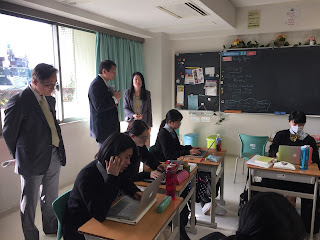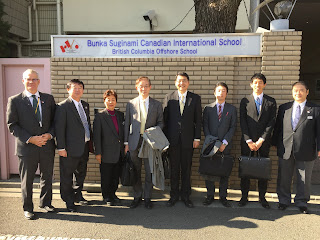Though our students are used to being observed, a team of 4 men in black suits and the BSCIS principal and VP all observing all of the classes was a little above the usual level of observation.
Once again, the students were great! They remained focused on the class and the teacher, they engaged in the task at hand and were relaxed enough to engage in interesting one-on-one conversations with the observers when they were approached. .
Like so many countries in the world, Japan is also re-thinking its' education system. Here is an opinion piece on the latest changes. We were quite honoured that at the end of their visit they said that our school was identified by the JP MOE as an experimental education site to learn from for other schools because they have been impressed by the results we are seeing from the work we do. They plan to engage us in future conversations about educational change in Japan.
This is a real honour for our team to be acknowledged by the Japanese Ministry of Education in this way!




Dan, Congratulations - sounds like you are instantiating some effective learning processes! Great article on measuring "progress" (relative term) versus "proficiency" (absolute term) in rating schools and teachers. Public health has faced similar challenge in measuring evidence-based outcomes of hospitals, physicians and individual patients against the backdrop of incoming patient population characteristics. This leads to a "process centric" approach where core processes are monitored and evaluated rather than absolute outcome metrics.
ReplyDelete-Steve-
Dan, it is exciting to think of what you and your colleagues have set in motion here ... and to imagine the ripple effects to come over time. Congratulations!
ReplyDelete